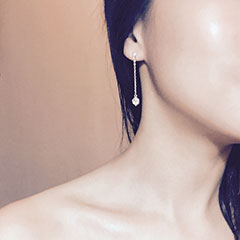24/03/2015
電子情緣之禍
受到無線電視節目明珠檔案的邀請,在節目上分享了我對電子情緣的看法,節目已在3月16日播放,在此亦跟大家分享一下。
每當要建立關係、求愛、約會,以至尋找終身伴侶,大部分人捨棄了舊日到酒吧、「夜浦」的方法,轉移投入電子世界。數碼化的世界為戀事帶來甚麼影響?優點顯而易見,社交媒體有助在較短時間內,建立龐大的社交網絡圈。對求愛者而言,網絡世界提供更快、更容易又更便宜的方法。即使穿著運動褲,安坐自己的房間之中亦可與對象調情,加配大量的個人資料與圖片,令感官不勝負荷。
有任何的缺點嗎?當然,還有不少。
失去私隱
未有網戀前,伴侶不會異想天開的拆對方的信件來看;在網戀的世代,現代情侶身上出現數個新的為愛付出的特徵:首先,他們共同分享一個附載照片的社交媒體帳戶,旨在炫耀戀情,然後開設一個象徵二合為一的電郵帳戶。最後,是設一個共同擁有的密碼。意味甚麼?這代表我們正改變衡量愛情輕重的方法,在乎的是那些網絡用語及受歡迎的指標。這個「分享」的方式非常危險,尤其是對那些需要個人空間的人。
改變人際技巧
a) 「朋友」這個詞語已失去其意義,因為我們在「成為朋友」或「結束友誼」的過程中並沒有投入太多的想法及情感。
b) 「交友」變成計分賽或人氣調查。這影響著我們的交友技巧與價值,並重建我們對關係的看法。
改變我們的核心價值
a) 更頻繁地檢視伴侶們的網上狀況,會令人更妒嫉,更不滿意現況。這威脅著關係的持續性。
b) 事實上,大多數人會用舊照片及一堆自吹自擂的資料來製作個人簡介,訓練我們接受不實之事的能力。我們學會讚頌謊言,又玩弄虛偽於指掌之中。公安最近拘捕了一個售賣假車票的商人,發現買票者重複購買假票,與商人穩定地進行交易,公安再深入調查,發現買票者知悉自己所購的是假票,這些車票不是用來乘車的,而是用來向公司報銷開支。
c) 為避過面對面的溝通,現時不少人選擇傳發短訊、電郵、whatsapp等來結束感情關係。一個正式的道別給予的是尊重,給予不來的我們已失去了人類最基本應有的禮貌。
揮之不去的壓力
在非網絡的世界,伴侶分開以後,各自關上自己的那道門,繼續前進。可是網絡世界卻會不斷提醒你前度的近況,因此要與一個人一刀兩斷幾乎是不可能的,尤其是兩人住在同一個城市,擁有共同朋友,又或是不幸地會在網上跟蹤對方。
根據尼爾森在2014年公布的調查,有些專家甚至聲稱社交媒體有機會改變我們的基因。遺傳學顯示,我們的經驗或會永久地改變我們的DNA,這個改變甚至是會遺傳下去的。這意味著那些我們所感受到的,如創傷及失落感會改變下一代人的連繫。從這個邏輯來看,究竟溝通方式會否帶來生理上的影響?
著名的數碼資訊學者Silva指出:「擾亂通訊技術如字元或語言,定會改變大腦的建構。」時至今日,我們使用Instagram這些應用程式為我們的回憶留下「心情剖白」,Silva預期在不久的將來,在不受手提儀器的限制下,我們亦能把自己全然地沉浸在別人建構的夢想空間之中。事情有好有壞,我們可以利用這些工具,在特定的地方及時間表述自己的世界觀,亦可以用來愚弄我們的觀眾。
我較守舊,我堅信要發展感情,讓二人真正地連繫的話,先要拔斷電源。
(按:中文內容乃翻譯及撮寫版本)
Digital Relationships
I was interviewed by TVB’s PEARL Report regarding Digital Relationships, and the program aired on 16th March. Here in synopsis.
When it comes to relationships, courting, dating or finding that life partner, many people are ditching the traditional pub and club approach and going digital. What impact has digitalization on relationships ? The advantages are obvious, social media can help build up a large network of “friends” within a relatively short period of time. For love seekers, the online method is quicker, easier and cheaper. One could flirt in sweatpants without leaving the comfort of one’s bedroom, and the stupendous array of profiles and pictures, a complete sensory overload…
Are there any downsides? Yes, plenty.
Loss of Privacy
In an offline relationship, one would not dream of opening the partner’s letters. In an on line relationship, several new symbols of romantic devotion appear to have taken hold among modern couples: First, they share a social media profile with photos to flaunt, then a joint email address, a symbol of their togetherness. Finally, a shared password. What does that mean? This means we are changing the way we measure the seriousness of our relationship by using digital verbiage and popular signposts. A very dangerous way of “sharing” especially for people who need personal space.
Change of Interpersonal Skills
a) The word “friend” loses the original meaning as we go through the motion of “befriending” or “unfriending” someone without too much thought or emotion.
b) The “friend-collecting” behavior becomes a score, a popularity poll. This affects our skills and values, and restructure how we think about relationships.
Change of Our Core Values
a) The more online users are checking up on their partners, the more jealous they are and the more dissatisfied they become. This threatens sustainability.
b) The fact that many would use outdated photos and a certain amount of misrepresentation to fudge their profiles is training us to accept dishonesty. We learn to glorify deceit & brandish fraudulence… Example: The Chinese police recently caught a fake train ticket trader, baffled by his stable business with repeat customers, he investigated, and found them knowingly bought fake tickets not for the ride, but to claim company expenses !!
c) Many now choose to break up with someone over text, email, whatsapp…to avoid face to face communications. We have thereby lost the most fundamental human decency of offering someone the dignity of a proper goodbye.
Lingering Stress
In an offline relationship, one could break up, close the door and move on. It is almost impossible to break up with someone online since one is constantly being reminded of what the ex is up to, especially if you live in the same city, share mutual friends, or have an unfortunate pre-disposition to online stalking.
According to a 2014 Nielsen survey, some experts even claim that social media may literally change our genes. The science of epigenetics has shown that our experiences may permanently, even heritably, transform our DNA. This means that things we feel, like trauma and loss, change the way future generations are wired. By this logic, can communication physically transform us ?
According to reputable digital scholar Silva, “ Disrupting technologies of communication – such as the alphabet, or language – absolutely change the architecture of the brain”.
Today, we use applications like Instagram as “mental scaffolding” for our memories – and soon, predicts Silva, we will be able to fully immerse ourselves in the output of someone else’s dreamspace without the confines of a handheld device. For better or worse, we either use these tools to offer our vision of the world in a certain place and time, or to stupefy our audience.
I am old fashioned, as far as relationships go, I remain a firm believer that it helps to unplug in order to connect.
《經濟通》所刊的署名及/或不署名文章,相關內容屬作者個人意見,並不代表《經濟通》立場,《經濟通》所扮演的角色是提供一個自由言論平台。
送禮活動浪接浪!想緊貼著數活動消息?即Like etnet Facebook專頁!► 立即讚好
















